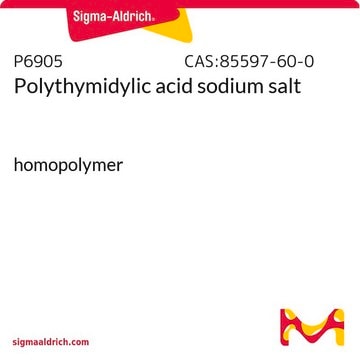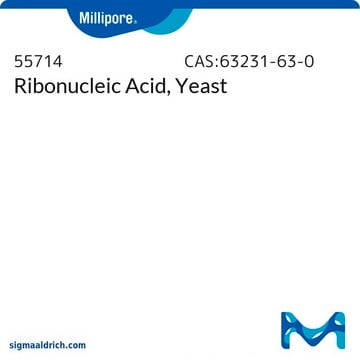P9403
poly(A)
Sinónimos:
Polyadenylic acid potassium salt, Poly(A) potassium salt
Iniciar sesiónpara Ver la Fijación de precios por contrato y de la organización
About This Item
Productos recomendados
¿Está buscando productos similares? Visita Guía de comparación de productos
Application
Polyadenylic acid (poly-A) is used to evaluate binding on cationic liposomes doped with non-ionic nucleolipids. Poly-A is used in small molecule mRNA targeted drug development to evaluate the binding of potential therapeutic agents such as the Isoquinoline group of alkaloids.
Preparation Note
Prepared from ADP with polynucleotide phosphorylase
Storage Class
11 - Combustible Solids
wgk_germany
WGK 3
flash_point_f
Not applicable
flash_point_c
Not applicable
ppe
Eyeshields, Gloves, type N95 (US)
Certificados de análisis (COA)
Busque Certificados de análisis (COA) introduciendo el número de lote del producto. Los números de lote se encuentran en la etiqueta del producto después de las palabras «Lot» o «Batch»
¿Ya tiene este producto?
Encuentre la documentación para los productos que ha comprado recientemente en la Biblioteca de documentos.
Polyadenylic acid binding on cationic liposomes doped with the non-ionic nucleolipid Lauroyl Uridine.
Cuomo F, Ceglie A, Colafemmina G, et al.
Colloids and Surfaces, B: Biointerfaces, 82, 277-282 (2011)
Prabal Giri et al.
Molecular bioSystems, 6(1), 81-88 (2009-12-22)
The use of small molecules to specifically control important cellular functions through binding to nucleic acids is an area of major current interest at the interface of chemical biology and medicinal chemistry. The polyadenylic acid [poly(A)] tail of mRNA has
Prabal Giri et al.
Current medicinal chemistry, 16(8), 965-987 (2009-03-12)
The use of small molecules to specifically control important cellular functions is an area of major current interest at the interface of chemical biology and medicinal chemistry. Recognition of ribonucleic acids (RNA) has emerged more recently as a critical event
Prabal Giri et al.
Mini reviews in medicinal chemistry, 10(7), 568-577 (2010-05-27)
After fifty years of DNA targeting through intercalators and groove binders and related studies now the current focus is in RNA targeting. Polyadenylic acid [poly(A)] tail of mRNA has been recently established as a potential drug target due to its
Tian-Li Duan et al.
Cells, 8(8) (2019-08-08)
Poly(A)-specific ribonuclease (PARN), a multifunctional multi-domain deadenylase, is crucial to the regulation of mRNA turnover and the maturation of various non-coding RNAs. Despite extensive studies of the well-folding domains responsible for PARN catalysis, the structure and function of the C-terminal
Nuestro equipo de científicos tiene experiencia en todas las áreas de investigación: Ciencias de la vida, Ciencia de los materiales, Síntesis química, Cromatografía, Analítica y muchas otras.
Póngase en contacto con el Servicio técnico







